First Minister Humza Yousaf makes a speech to the Scottish Parliament chamber © Scottish Parliament
It’s an old song, popular with drinkers and written by Scotland’s most famous poet, Robert (Robbie) Burns; and it goes like this, normally set to music, of course:
“O ye’ll tak’ the high road, and I’ll tak’ the low road,
And I’ll be in Scotland afore ye,
But me and my true love will never meet again,
On the bonnie, bonnie banks o’ Loch Lomon’”
For “Lomon” we should read “Lomond”; folk songs change words, spelling and grammar. Scotland is not short of popular folk songs. Even people with no entitlement to wear the kilt or sport a particular tartan are often persuaded to claim some Scottish roots. I’m told that my name suggests I may have some Scottish ancestry deep in my past; that’s according to my dentist, a dyed-in-the-wool Scot. If so, I apologise to my many Scottish friends. It’s not a claim I make lightly. The Scots are a proud people; I spent my honeymoon there by the banks of St. Mary’s Loch, not far from the English border, but the hotel my wife and I stayed in has gone now, having been turned into a private house. But Scotland’s new First Minister has few ethnic origins among the lands of lochs, braes, sporrans and the Tam O’Shanter (the traditional tartan beret worn by some Scottish men, usually with a round woollen ball sewn into the centre). This strange headgear, part of the uniform for various regiments in Scotland (of course), and also some in Australia and Canada that have Scottish roots. The name comes from a poem by Robbie Burns, Scotland’s “poet laureate”:
“This truth fand honest Tam o’ Shanter,
As he frae Ayr ae night did canter:
(Auld Ayr, wham ne’er a town surpasses,
For honest men and bonie lasses).”
I assume he meant “bonny” lasses, rather than “bony”, which would just mean exceptionally thin. I can’t swear to his claims personally; I don’t think I’ve ever visited Ayr. Tam O’Shanter was Robbie burns’ own favourite among his many, many poetical works. But like many parts of Scotland Ayr produces whisky as well as fine people, so it must be alright. But where does that leave Scotland’s new First Minister, Humza Yousaf? I am not and never could be a nationalist but it seems pretty clear that Humza Yousaf is not a name linked into the history of the clans. There is no Yousaf listed among the spear carriers or claymore-wielders, nor even the foot-soldiers, at either of the Battles of Alnwick, nor at Sterling Castle nor Culloden.

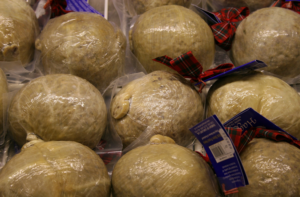
If you’ve never been to Scotland I urge you most sincerely to pay it a visit: it’s stunningly beautiful, with hills and mountains, as well as the many lakes (which the Scots call ‘lochs’) and friendly stone-walled villages and towns, plenty of pubs, all of it as sternly beautiful and heart-warming as anywhere you’ve ever seen. It’s not only the whisky for which it’s justly famous. It also claims to have given the world porridge (a disputed claim) and a variety of other foodstuffs, such as shortbread and for a number of foodstuffs, not least the mighty haggis, a savoury meat pudding, normally served with mashed potatoes and “neeps” (turnips) in a whisky sauce. It’s served on special occasions, like Burns Night, the 25th January, when haggis is consumed with much ceremony and whisky is drunk. By the end of the party, most of the guests are, too. If you’re feeling curious as to what exactly a haggis is, Scotland’s world-famous national dish is made from a sheep’s stomach, stuffed with a boiled mix of liver, heart, lungs, rolled oats and other bits and pieces. It is normally made with great care because it’s so symbolic of Scottishness!
The event on each 25th January celebrates the poet, Robert (Robbie or even Rabbie)) Burns, who even wrote a poem called “Address to a Haggis” in praise of this noteworthy dish. Of course, the dish must be eaten, accompanied by glasses of whisky (quite a lot of them, usually) and with a recital of Burns’ famous poem. If you think you don’t like whisky (which would be a sacrilege in Scotland) the Scots would say you just haven’t tried the right one yet; there are more than a hundred distilleries in Scotland, as well as five distilling regions, each whisky and each region having its own distinctive flavour. I’ve yet to find one I don’t like, but there are still a lot out there I’ve yet to try. Maybe I’ll get through them all one day (although not ALL of them in one day…).
THAT WAS THEN, THIS IS NOW
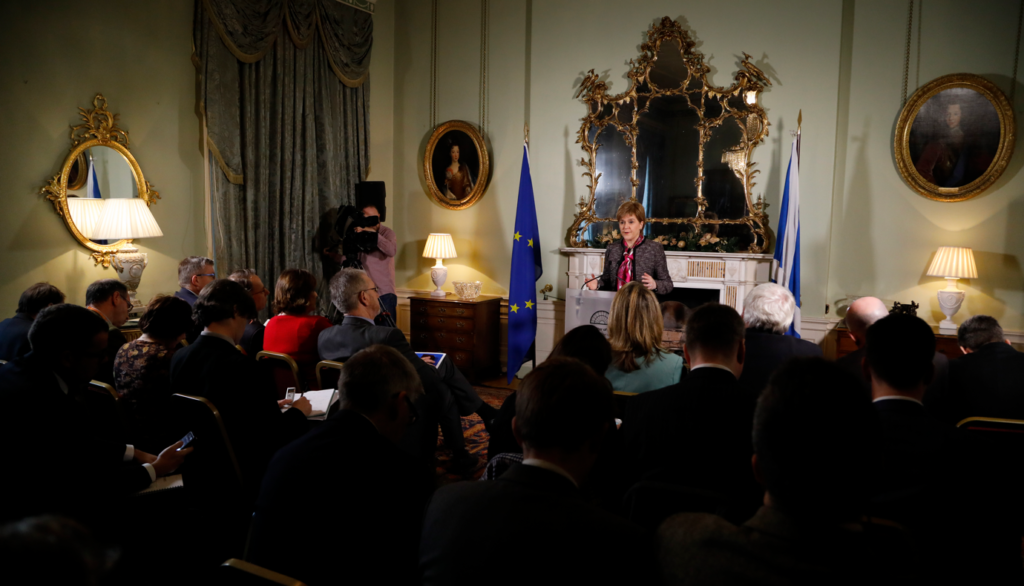
History is all very well, but right now, in 2023, Scotland has a new First Minister. His predecessor, Nicola Sturgeon, shocked the Scottish National Party and the country by her unanticipated resignation on 15th February after eight years at the helm and seven years before that as Deputy First Minister. Taking such a step triggered a vicious leadership battle, but with the Scottish parliament arranged as a hemicycle, instead of the face-to-face “ready for battle” set up in London, with the seats placed two sword-lengths apart, nobody drew an edged weapon or swung a battle axe. Politics must have been really interesting back in those far-off days!
But there was nothing like that in the choice of Humza Yousaf to occupy the top spot. Yousaf previously served under Sturgeon as justice secretary from 2018 to 2021 and then as health secretary from 2021 to 2023. It has been said that he did not distinguish himself in either rôle. He narrowly defeated Kate Forbes to gain the post but since then, when he’d become First Minister, she has turned down his offer of a junior place in his cabinet as Rural Affairs Secretary. As reported in The Telegraph after they both appeared on the Holyrood Sources podcast, Forbes said she was willing to draw a line under the acrimonious leadership contest. “I’m very happy to pick up where I left it with friends and colleagues last summer,” she said, but added: “That’s always going to be a two-way street so it remains to be seen whether the hand of friendship that I offer is reciprocated.” At least that hand won’t be holding a claymore.
What do we know of Yousaf? “Not a lot and none of it good,” commented one cynical (but anonymous) party member. Certainly, his reputation is not unsullied. One article in The Times describes him as “a raging leftie, serial incompetent administrator, defender of every failed boilerplate statist nostrum.” (Boilerplate in this context means “lacking any imagination”). He was educated at a private Scottish school – but then so were Michael Gove and Tony Blair.
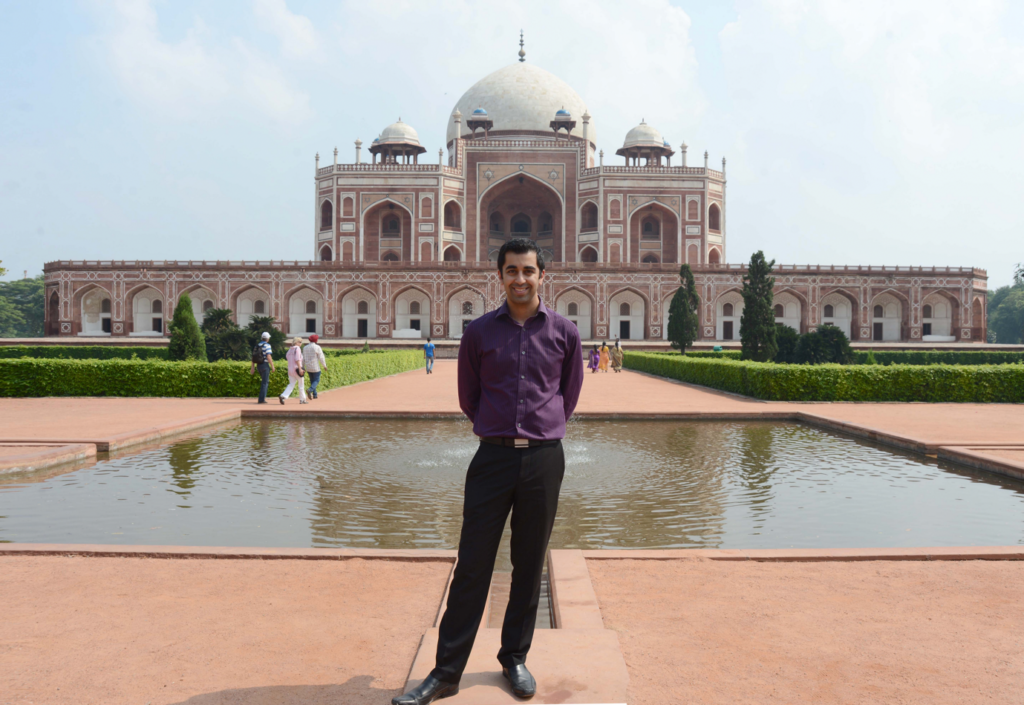
The 16th century mausoleum is to be restored through a project of the Nizamuddin Urban Renewal Initiative © Scottish Government
Not a promising start, then, so what about his record? Well, he’s been accused of making it clear that he looks down on his opponents, considering them his inferiors. It’s not a useful or appealing attribute. For a time, he served as a parliamentary assistant to Scottish National Party (SNP) members of the Scottish parliament. He won a seat in the Scottish parliament in 2011 while only in his mid-20s but while showing a surprising level of self-confidence. He had been born to Pakistani immigrants in Glasgow and his first job in politics was as parliamentary assistant to the first Muslim elected to the Scottish parliament, Bashir Ahmad. Before his own election, Yousaf worked for both Nicola Sturgeon and her predecessor, Alex Salmond. He then served as a communications officer at SNP headquarters and once he’d been elected, he was appointed as a junior minister under Salmond, then in 2012 as Minister for External Affairs and International Development.
His first big mistake concerned something that is very important to Scotland: the ferry services that link the Scottish mainland with the country’s many islands. Yousaf had been chosen by Sturgeon to be Minister for Transport and the Islands. However, the shipyard building two of the vessels went bust and was nationalised. Sturgeon launched one of the hulls in 2017, but to make it look closer to completion than was, in fact, the case, fake windows had to be painted on the outside. It’s still awaiting completion. After that debacle, Yousaf was given the Justice portfolio, where he tried to introduce very draconian measures to crack down on hate crime. Indeed, the measures he proposed were so draconian that they drew savage criticism from churches, secularists, the Police Federation (or parts of it), lawyers and many others in Scotland who feared the loss of free speech across the board.
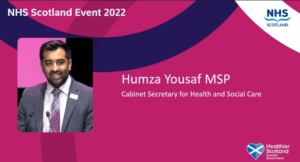
What could he mess up next? Sturgeon opted for the health service, letting Yousaf take over running NHS Scotland in 2021. It was a tricky brief to be given in the midst of a deadly pandemic, but he seems to have succeeded in making matters worse anyway. His performance attracted a lot of letters of complaint and led, according to Iain Martin, writing in The Times, to him being given the nickname Humza Useless. No, I know: it’s not a very funny pun; in fact, it’s barely one at all, but even parts of the SNP itself have taken to using it. He’s not a universally admired figure, but then, neither was Sturgeon. She also made quite a few mistakes during her time in office.
However, no one gets chosen to stand above others without impressing a few people. “I remember meeting Humza at a Burns Supper at the British Ambassador’s residence,” former Scottish Labour MEP Catherine Stihler told me, for instance. “It was a great evening.” But the meeting clearly meant more than a serving of haggis and a glass of whisky, at least in terms of her encounter with Humza Yousaf. “From speaking to him, he was clearly ambitious,” she said, “and it was no surprise, seeing him in the contest. He certainly has many challenges from health to education, from island ferries to the economy. The task ahead as First Minister is not an easy one and will take all of Scotland’s political talent to solve.” Stihler is also CEO of Creative Commons, an American non-profit organization and international network devoted to educational access and expanding the range of creative works available for others to build upon legally and to share. As for Yousaf, the people of Scotland now hold their collective breath and keep their fingers crossed that Stihler’s more optimistic view is fulfilled.
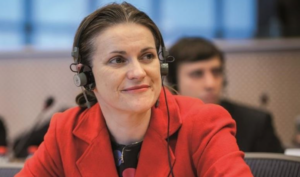
Yousaf’s family is well aware of racism. His mother, Shaaista Bhutta, was born in Nairobi, Kenya, to a Punjabi family, but they faced hate attacks from Kenyans who felt that all the jobs there should go to Africans. They had no room for Asians. I can’t imagine that it was ever Yousaf’s intention simply to say “mimi mkubwa” to his colleagues. It means: “I am great,” in Swahili. The Kenyans would have understood if he had. Huge differences of opinion remain between SNP supporters and, for instance, Conservatives, according to a poll conducted for The Economist by Savanta at the time of Sturgeon’s resignation. Even so, Yousaf will want the support of “watu wote” (all the people), surrounded by his supporters, and not to be “mtu peke yake” (the man by himself). There has to be unity, or “sisi sote” – we all together. My father, who learned Swahili when serving in Kenya during the war, would often greet us children with the question: “U hali gani?”, meaning “how are you”, to which I would reply “Njema”- good. I still have his 1934 book of Swahili exercises. According to The Economist, however, Yousaf lacks Sturgeon’s authority and her charisma. He only crept into the top slot with 52% of the votes cast. The SNP has been shrinking, too, with its 72,000-strong membership far down from its peak of 125,000. The woman he defeated to take over the party fears that “more of the same” would be an acceptance of mediocrity.
| POPULAR OR PASSABLE?
In a popularity poll of potential replacements for Sturgeon, Yousaf came last: the least popular choice, yet they chose him. The Economist points out how much more difficult Yousaf will find it in negotiating with Westminster. When Sturgeon held the post, the English ministers knew she spoke for a majority in Scotland. Now, with Yousaf in charge, it’s by no means certain that he even speaks for the majority of the SNP. Kate Forbes, the one who turned down a junior cabinet post, has warned that Yousaf will have little influence in the corridors of power on either side of the border. If Yousaf could offer his people a meaningful referendum on independence from Britain he would probably be one of the most popular men in Scotland. But he can’t: Westminster retains a veto, making independence less and less likely.
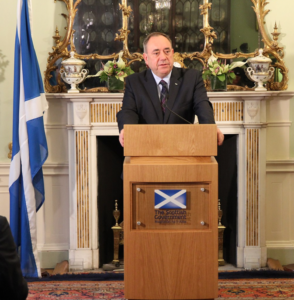
Former Scottish First Minister Alex Salmond told a BBC television programme that Humza faces three immediate challenges: “One, he’s got to unite his party; second, he’s got to unite the national movement if he seriously wants to take on Westminster; and thirdly, he’s going to have to re-establish the SNP’s reputation, which was hard-won for political competence in running Scotland.” As for advice on how to take the project forward, Salmond admitted that Yousaf is unlikely to listen much to his views, but said: “He should remember that Ash Regan and Kate Forbes got more votes than he did in the leadership election. He needs to get them into his cabinet, whatever else he does. He’s got to reunite his party.” That won’t be easy, and it wouldn’t be even if Yousaf was more popular than he is. Salmond, of course, formed a rival pro-independence party, Alba, and has been at loggerheads with Sturgeon since 2018, with Sturgeon making accusations against of sexual harassment against Salmond which he firmly denies. There’s very clearly no love lost between the two. Salmond has made it clear that Yousaf must concentrate, in his view, on the issues that matter to the Scottish people. “Scotland is an energy rich nation but our people can’t afford to heat their homes,” he said on an election poster, “That’s the sort of issue that Humza Yousaf should be facing down Westminster over, not unpopular policies grafted onto the independence movement by the Green Party.”

It was the British government’s veto on another independence referendum that pulled the rug from under Sturgeon and the SNP, and that stopped people from opting for independence at the ballot box. But things can change, even if it’s going to be harder for Yousaf to claim he speaks for most of Scotland in negotiations. What’s more, the SNP (and Salmond’s “Alba”) lack a credible policy for stepping around this seemingly insurmountable obstacle to the independence dream. Yousaf has said he will step up a gear in his battle to persuade UK prime minister Rishi Sunak to permit a meaningful plebiscite on letting Scotland go its own way. It was the American humourist Josh Billings who suggested how best to win a test of public opinion: “Vote early and vote often,” he said. Another American, the financier and presidential adviser Barnard Baruch of New York who suggested the best way to avoid disappointment: “Vote for the man who promises least,” he wrote, “he’ll be the least disappointing.”
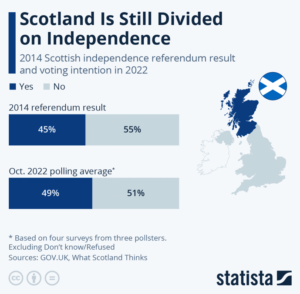
So what does all this means – actually and potentially – for Scotland’s neighbour to the south? If Britain was still in the EU, it wouldn’t have mattered much, with free movement and open borders, but the way things are now, nothing is quite as certain. I have a cousin who, in a recent phone conversation, told me that he and his wife had voted for Brexit so that “we won’t be told what to do by foreigners”, which shows an amazing ignorance of how the EU works and what it means, and I’m afraid the same unassailable ignorance would creep into any vote on Scotland’s independence. People, by and large, don’t want the facts on any major issue upon which they’re called to vote. All you have to do is listen to whichever politician is shouting the loudest and give his or her campaign your support. Yes, of course that’s ridiculous, but most people couldn’t tell you the difference between a plebiscite and a referendum, but there is one. A referendum is a vote to change the constitution, while a plebiscite is a vote by the common people – the “plebs” of ancient Rome, hence the name – is a vote for or against a proposal that doesn’t actually change the constitution, so is of slightly (but only slightly) less significance. Maybe if the vote about Scotland’s self-determination could be defined as a “plebiscite” instead of a “referendum” it would matter less and cause a smaller stir. That’s just an idea, which I throw in for free. In any case, I am and al ways shall be a “pleb” – a plebian.

As the American Democrat politician Henry Wallace (1888-1965) famously put it in a speech in 1942, “the century that will come out of this war – can be and must be the century of the common man.” Hear, hear to that! And I don’t care if the speaker has a Scottish accent, a Pakistani accent, a Kenyan accent or whatever you like. Or you can sing what used to be Scotland’s national anthem, written by Robert Bruce and in its original dialect:
“Scots, wha hae wi Wallace bled, (Sots, we have with Wallace bled)
Scots, wham Bruce has aften led, (Scots who Bruce has often led)
Welcome tae yer gory bed, (welcome to your gory bed)
Or tae victorie (or to victory)
I’ve no idea what it sounds like in Swahili, but anything Burns wrote would be great. Kwaheri (Goodbye).

